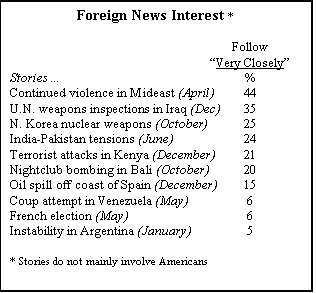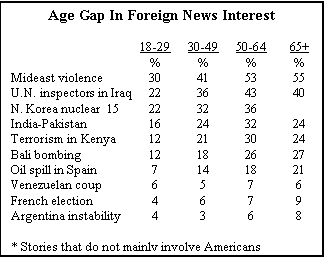Introduction and Summary
A series of horrifying sniper attacks in the Washington, D.C. area attracted the most public interest of any news story in 2002. But the growing prospects of war with Iraq, as well as the continuing threat of terrorism and the aftermath of 9/11, also drew high levels of attention throughout the year.

Nearly two-thirds of Americans (65%) said they tracked news of the sniper case very closely, while 26% followed these reports fairly closely. Owing to the intensive news coverage of this story, interest was not limited to the mid-Atlantic area where the shootings occurred. Nine-in-ten in every part of the country said they followed this story at least fairly closely.
The Iraq debate began resonating with the public in late summer. In August, roughly half of the public (48%) said they were tracking this story very closely. By early October, six-in-ten were paying very close attention, with another 28% following it fairly closely. Clearly, interest in this issue will continue, and likely increase, in the coming year as the question of military action comes to a head.
Not surprisingly, terrorism was less of a public focus than in 2001. Last year’s attacks attracted very close interest from 74% of the public (22% followed them fairly closely), and eight of the year’s top ten stories related in some way to terrorism. This year, five of the top ten stories had something to do with terrorism, but overall interest was much lower. The top terrorism stories — the U.S. war in Afghanistan and reports on U.S. defenses against domestic terrorism — drew very close interest from about half of the public (51% each).
Pledge Controversy Draws Attention
In July, a majority of Americans (52%) paid very close attention to stories on a controversial federal court ruling that the words “One nation, under God” cannot appear in the Pledge of Allegiance. It was the year’s third highest-rated story and one of the most closely followed court decisions since the Pew Research Center began measuring news interest in 1986.
Last summer’s series of child abductions, which drew considerable news coverage, also attracted a large audience. In September, nearly of half of Americans (49%) followed the kidnappings very closely, and this story struck a chord with women, in particular: 57% of women followed the child abductions very closely, compared with 41% of men.
News of the court ruling on the Pledge and child abductions drew more interest than several other major domestic stories, including the Catholic priest scandal and stories on corporate wrongdoing. Roughly four-in-ten (38%) tracked the priest scandal very closely. The priest controversy initially was centered on Boston. Catholics and people in the Northeast took particular interest in this story (45% very closely).
The well-publicized scandals affecting corporations like Enron and WorldCom drew comparatively less interest. Pew asked questions about the scandals on several occasions; interest was highest for reports on WorldCom in July but only about three-in-ten (31%) followed those reports very closely.
Record Interest in Mideast

The public tends to pay little attention to foreign news, aside from stories that mainly involve Americans. The notable exception is news about the Middle East. In April, 44% paid very close attention to violence between Israelis and Palestinians (33% fairly closely). That not only made it the biggest foreign news story of the year, but it was one of the most closely followed international stories in Pew’s 16-year history of measuring news attentiveness.
Other overseas news stories — those not directly involving Americans or possible U.S. military action in Iraq — attracted far smaller audiences. Aside from reports on U.N. weapons inspections in Iraq, which may set the stage for military action, none of these stories drew interest from more than a quarter of the public. Interest was especially low in overseas political and economic developments: roughly one-in-twenty Americans paid close attention to the failed coup in Venezuela (6%); an upset victory by a right-wing candidate, Jean-Marie Le Pen in a preliminary election in France (6%); and political and economic instability in Argentina (5%). These attracted the lowest interest of any stories this year.
Overseas News Divides Generations

Traditionally, young people take little interest in overseas news and that was again the case in 2002. Ongoing violence in the Middle East was the top story for people under age 30, as it was for those in other age groups. But just three-in-ten followed those reports very closely, compared with 41% of those 30-49 and more than half of those age 50 and older. Young people displayed much less interest in the year’s other foreign stories.
Educational differences have less of an effect on foreign news interest. College graduates showed no more interest in most foreign news stories than did those who completed some college or high school graduates. The exception is news on the U.N. weapons inspectors in Iraq; more than four-in-ten college graduates tracked those reports very closely, compared with roughly a third of those who did not complete college and high school graduates.




